NEXT ACTIVITY
—
RECENT ACTIVITIES
10 September 2020: IEEE-EMC Distinguished Lecturer Seminar by Dr. Xiaoxiong Gu
Topic: “Opportunities, Challenges, and Implementations of Silicon Integration and Packaging in mmWave Radar and Communication Applications”
Location: Gebze Technical University, Turkey
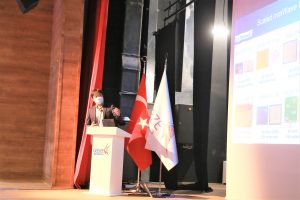
vTools Link: https://events.vtools.ieee.org/m/239984
—
13 March 2020 (13:40): IEEE AP/MTT/EMC/ED Turkey Seminar Series (S.68)
Speaker: Assoc. Prof. Tolga Çukur, Bilkent University
Topic: “Breaking Barriers in Structural and Functional Neuroimaging Through Machine Learning”
Location: Middle East Technical University, Ankara, Turkey
Abstract: MRI offers an unrivaled opportunity to noninvasively examine the structure and function of the human brain in vivo. Yet, MRI exams are hindered by limitations on spatiotemporal resolution and contrast of acquired images as well as inefficient experimental designs. Classical approaches to reconstruction, processing and analysis of imaging data often fail to address these limitations. In this talk, I will share an overview of recent efforts in my lab to devise novel machine learning techniques in order to surpass fundamental barriers in structural and functional MRI. I will showcase examples where machine learning empowers rapid, high-quality and high-sensitivity assessments in neuroimaging.
Bio: Dr. Çukur received his B.S. degree from Bilkent University in 2003, and his Ph.D. degree from Stanford University in 2009, both in Electrical Engineering. He was a postdoctoral fellow at Helen Wills Neuroscience Institute at University of California, Berkeley till 2013. Currently, he is an Associate Professor in the Department of Electrical and Electronics Engineering, UMRAM, and Neuroscience Program at Bilkent University. His lab develops computational imaging methods for understanding the anatomy and function of biological systems in normal and disease states. He is the recipient of TUBITAK Career Award (2015), TUBA-GEBIP Outstanding Young Scientist Award (2015), BAGEP Young Scientist Award (2017), IEEE Turkey Research Encouragement Award (2017), Science Heroes Association Young Scientist of the Year Award (2017), METU Prof. Dr. Mustafa Parlar Foundation Research Incentive Award (2019), and he is a senior member of IEEE (2017).
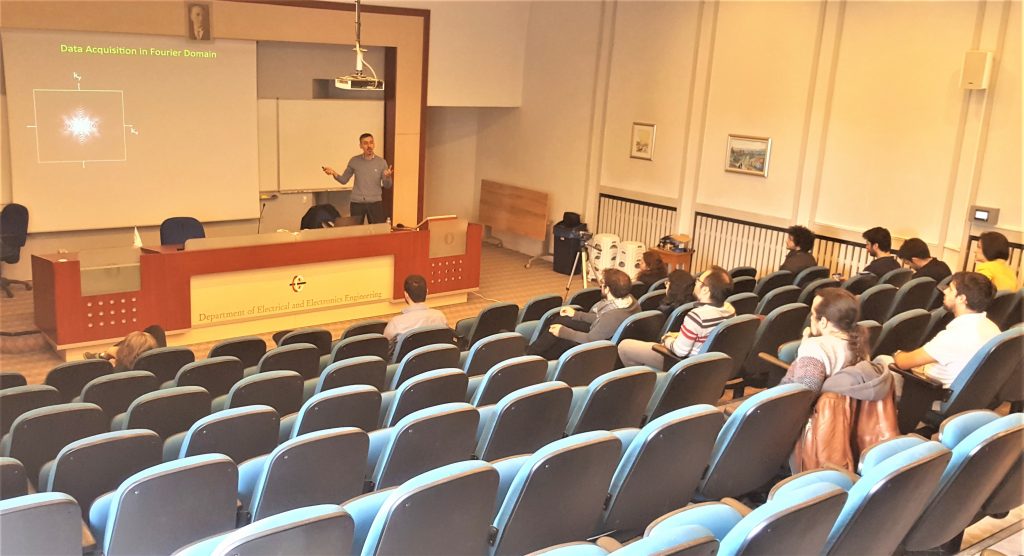
vTools Link: https://events.vtools.ieee.org/m/227127
—
07 March 2020 (13:40): IEEE AP/MTT/EMC/ED Turkey Workshop
Speaker/Instructor: Fatih Genç, BMC
Topic: “Design of Wireless Communication Systems Using MATLAB and USRP”
Location: Middle East Technical University, Ankara, Turkey
Poster (Turkish)
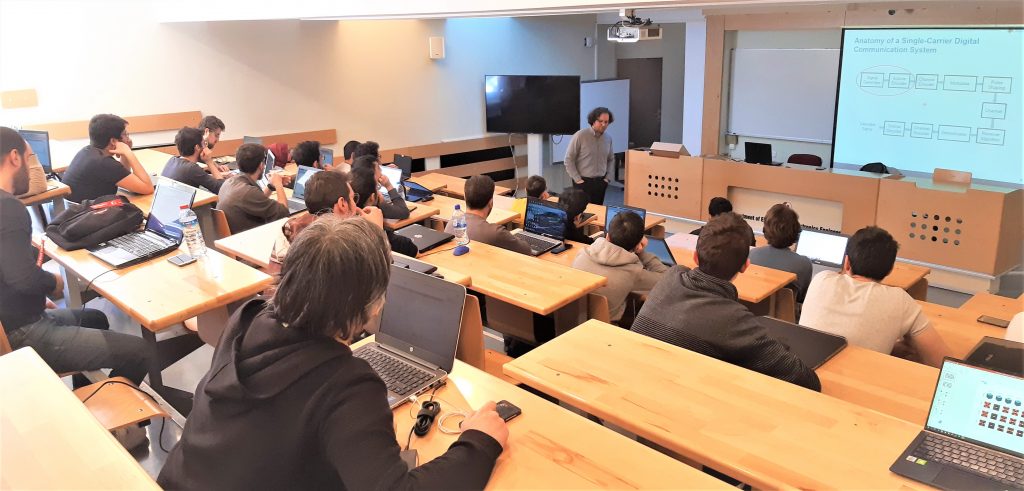
vTools Link: https://events.vtools.ieee.org/m/226228
—
06 March 2020 (13:40): IEEE AP/MTT/EMC/ED Turkey Seminar Series (S.67)
Speaker: Assoc. Prof. Sedat Nizamoğlu, Koç University
Topic: “Bioelectronic Neuron-machine Interfaces Controlled with Light”
Location: Middle East Technical University, Ankara, Turkey
Abstract: Bioelectronic devices controlling neurons show high promise for advanced treatments of a broad range of neurological disorders such as retinal degeneration, Parkinson’s and Alzheimer’s. Light is an excellent tool for communicating with biological systems, thanks to its high spatial and temporal resolution. In my speech, I will discuss how we can generate bioelectronic stimuli with optoelectronic devices to control neurons [1]. For this purpose, I will present innovative devices based on organics and nanomaterials with high light sensitivity [2]. I will also show that nanoscale charge control can provide photostimulation of neurons at low light level [3,4]. These findings bring new approaches to superior light-triggered bioelectronic control of neural activity.
[1] Bahmani Jalali, H.; Mohammadi Aria, M.; Dikbas, U. M.; Sadeghi, S.; Ganesh Kumar, B.; Sahin, M.; Kavakli, I. H.; Ow-Yang, C. W.; Nizamoglu, S., Effective neural photostimulation using indium-Based type-II quantum dots. ACS nano 2018, 12 (8), 8104-8114. [2] Aria, M. M.; Srivastava, S. B.; Sekerdag, E.; Dikbas, U. M.; Sadeghi, S.; Pering, S. R.; Cameron, P. J.; Gursoy‐Ozdemir, Y.; Kavakli, I. H.; Nizamoglu, S., Perovskite‐Based Optoelectronic Biointerfaces for Non‐Bias‐Assisted Photostimulation of Cells. Advanced Materials Interfaces 2019, 1900758. [3] Srivastava, S. B.; Melikov, R.; Aria, M. M.; Dikbas, U. M.; Kavakali, I. H.; Nizamoglu, S., Band Alignment Engineers Faradaic and Capacitive Photostimulation of Neurons Without Surface Modification. Physical Review Applied 2019, 11 (4), 044012. [4] Bahmani Jalali, H.; Karatum, O.; Melikov, R.; Dikbas, U. M.; Sadeghi, S.; Yildiz, E.; Dogru, I. B.; Ozgun Eren, G.; Ergun, C.; Sahin, A., Nizamoglu, S., Biocompatible Quantum Funnels for Neural Photostimulation. Nano letters 2019, 19 (9), 5975-5981.Bio: Sedat Nizamoglu received his B.Sc. degree in Electrical and Electronics Engineering (EEE) in 2005, M. Sc. degree in Physics as a Valedictorian in 2007 and his Ph.D. in EEE in 2011 at Bilkent University. Immediately after graduation, he continued as a research fellow with a joint affiliation with Harvard Medical School and Wellman Center for Photomedicine, Massachusetts General Hospital in USA. Before joining Koç University, he was a faculty member at Özyeğin University. His research focuses on the demonstration of innovative bioelectronic and optoelectronic devices and interfaces for the applications to energy, medicine, and environment. He has published more than 60 research papers in prestigious journals including Nature Communications, Nature Photonics, Advanced Materials and Nano Letters. He was recognized by MIT Technology Review as Innovator Under 35 Turkey. He received Encouragement Award by TUBITAK (Turkish NRF), Outstanding Young Scientist Award by Turkish Academy of Sciences and Science Academy. In addition, he was awarded an ERC (European Research Council) Starting Grant.
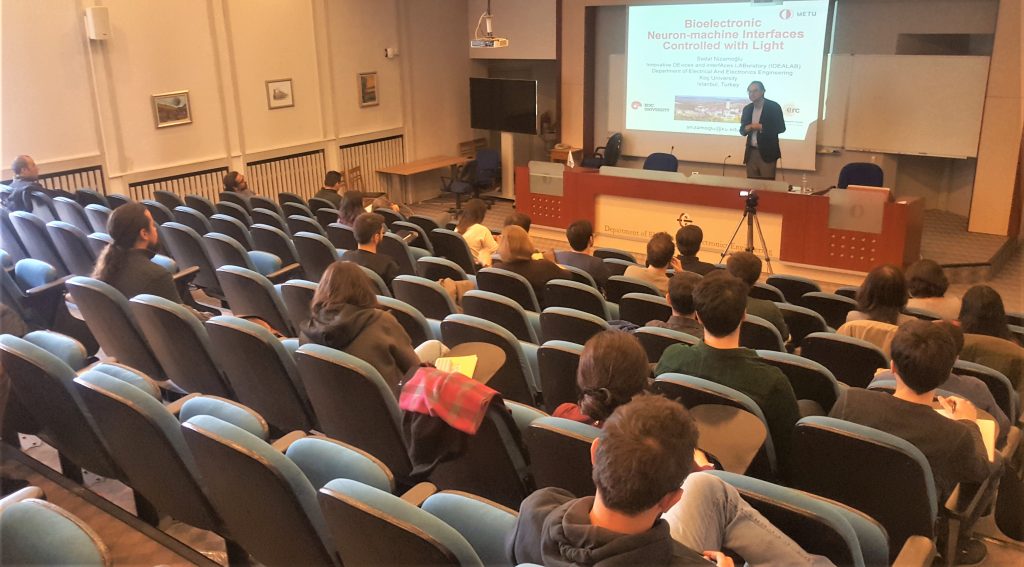
vTools Link: https://events.vtools.ieee.org/m/226225
—
28 February 2020 (13:40): IEEE AP/MTT/EMC/ED Turkey Seminar Series (S.66)
Speaker: Prof. Haluk Külah, Middle East Technical University
Topic: “Microsystems for Biomedical Applications: BioMEMS & Fully Implantable Cochlear Implants Enabled by BioMEMS: FLAMENCO”
Location: Middle East Technical University, Ankara, Turkey
Abstract: This presentation will introduce microsystems for biomedical applications and related projects at BioMEMS Research Group. The first part of the presentation will cover microfluidics and uTAS related projects focused on cell separation and cell counting (dielectrophoresis chips for cell separation, gravimetric sensors for cancer cell detection, microvalves and pumps for lab-on-a-chip systems, and electrochemical sensors for bacteria and toxin detection). The second part will introduce the ERC supported FLAMENCO project on next generation cochlear implants, and the progress up to date.
FLAMENCO has a ground-breaking nature as it revolutionizes the operation principle of the conventional Cochlear Implants (CI). The overall objective of FLAMENCO is to develop a fully implantable, low-power, energy harvesting (self-powered), next generation CI mimicking the natural hearing mechanism of the ear. Fully Implantable Cochlear Implant (FICI) has the potential to eliminate the aforementioned concerns, but a reliable internal power source and an implantable acoustic sensor that can fit into a small volume are the main bottlenecks. In FLAMENCO project, we are working towards overcoming these challenges to improve the lives of people with sensorineural impairment.
Bio: Prof. Dr. Haluk Külah received B.Sc. and M.Sc. degrees in electrical engineering from METU, Ankara, Turkey, in 1996 and 1998, respectively. He received Ph.D. degree in electrical engineering from the University of Michigan, Ann Arbor, in 2003. From 2003 to 2004, he was employed as a Research Fellow at the Department of Electrical Engineering and Computer Science, the University of Michigan. Dr. Külah joined the Electrical and Electronics Engineering Department of METU as a faculty member in 2004. His research interests include MEMS, MEMS-based energy scavenging, microsystems for biomedical applications (BioMEMS), and mixed-signal interface electronics design for MEMS sensors. Dr. Külah is member of Board of Directors and Executive Committee of METU MEMS Research Center. He has been awarded with 2009 Research Encouragement Award by Prof. Mustafa PARLAR Education and Research Foundation, 2013 Research Encouragement Award by TÜBİTAK, 2013 IBM Faculty Award, and 2015 Young Scientist Award by The Science Academy, Turkey. Dr. Külah has received EU Horizon 2020 2015 ERC Consolidator Grant by FLAMENCO project, which is on autonomous and fully implantable cochlear implants. (https://biomems.eee.metu.edu.tr)
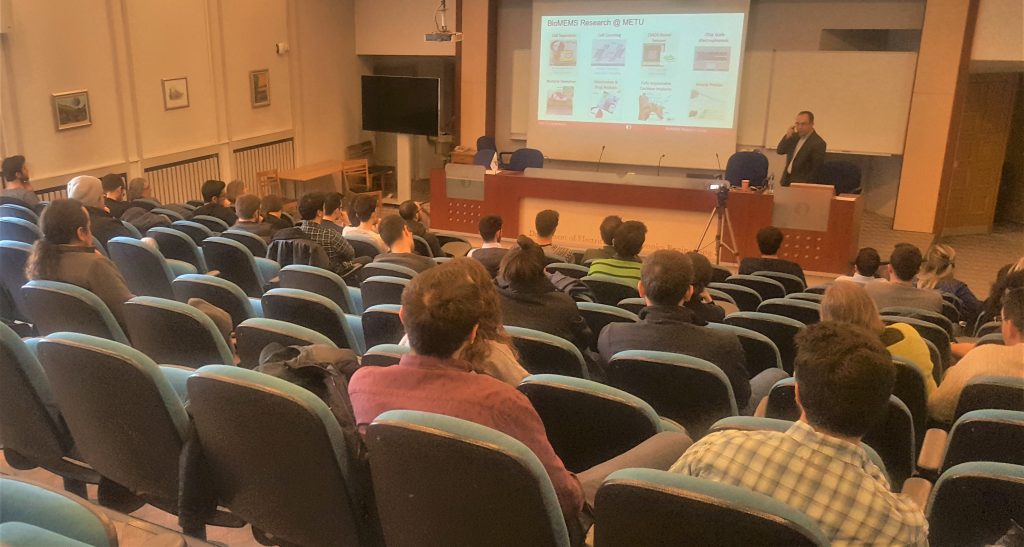
vTools Link: https://events.vtools.ieee.org/m/226223
—
21 February 2020 (13:40): IEEE AP/MTT/EMC/ED Turkey Seminar Series (S.65)
Speaker: Prof. Pınar Duygulu Şahin, Hacettepe University
Topic: “Recognizing and Transferring the Styles of Artists Who Illustrate Children’s Books”
Location: Middle East Technical University, Ankara, Turkey
Abstract: In this talk, I will present our recent works to explore illustrations in children’s books as a new domain in classification of artists and unpaired image-to-image translation. Our work is motivated from a young boy’s capability to recognize an illustrator’s style in a totally different context. The boy’s enthusiasm let us to start the journey to explore the capabilities of machines to recognize the style of illustrators.
First, we collected pages from children’s books to construct a new illustrations dataset consisting of about 9500 pages from 24 artists. We exploited deep networks for categorizing illustrators and with around 94% classification performance our method over-performed the traditional methods by more than 10%.
Going beyond categorization we explored transferring style. We show that although the current state-of-the-art image-to-image translation models successfully transfer either the style or the content, they fail to transfer both at the same time. We propose a new generator network to address this issue and show that the resulting network strikes a better balance between style and content.
There are no well-defined or agreed-upon evaluation metrics for unpaired image-to-image translation. So far, the success of image translation models has been based on subjective, qualitative visual comparison on a limited number of images. To address this problem, we propose a new framework for the quantitative evaluation of image-to-illustration models, where both content and style are taken into account using separate classifiers. In this new evaluation framework, our proposed model performs better than the current state-of-the-art models on the illustrations dataset.
Bio: Pınar Duygulu has received her BSc, MSc and PhD degrees from Department of Computer Engineering at Middle East Technical University, Ankara, Turkey in 1996, 1998 and 2003 respectively. During her PhD, she was a visiting scholar at University of California at Berkeley under the supervision of Prof. David Forsyth. After being a post-doctoral researcher at Informadia Project at Carnegie Mellon University, she joined to Department of Computer Engineering at Bilkent University, Ankara, Turkey in 2004. During 2014 and 2015 she was at Carnegie Mellon University as a research associate. Currently, she is a faculty member at Department of Computer Engineering at Hacettepe University, Ankara, Turkey. She received Science Academy’s Young Scientist Award (BAGEP) in 2015, Fulbright scholarship in 2013, TUBITAK Career award in 2005, and the best paper in Cognitive Vision award at European Conference on Computer Vision in 2002. Her current research interests include computer vision and multimedia data mining, specifically object, face and action recognition in large image and video collections and analysis of historical documents.
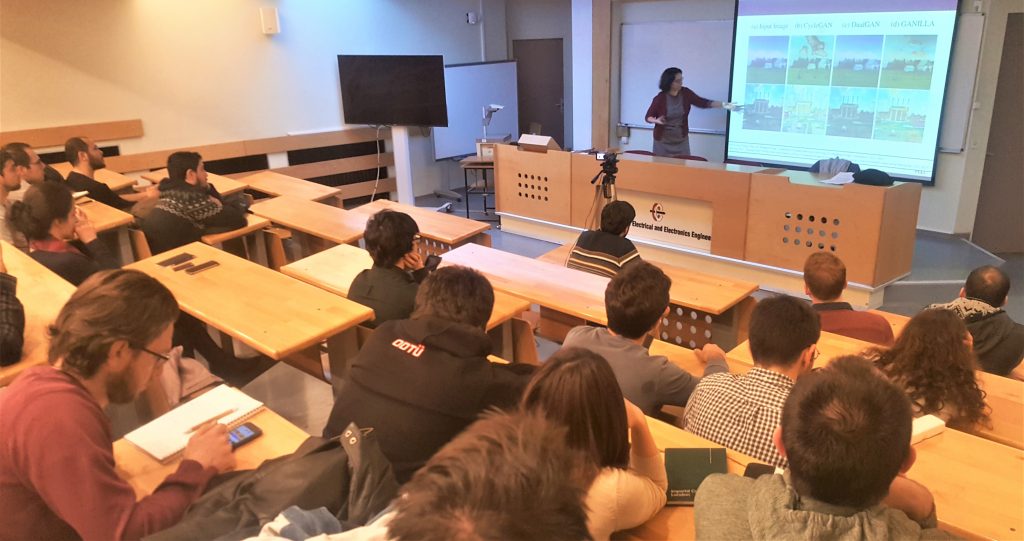
vTools Link: https://events.vtools.ieee.org/m/224527
—
——-